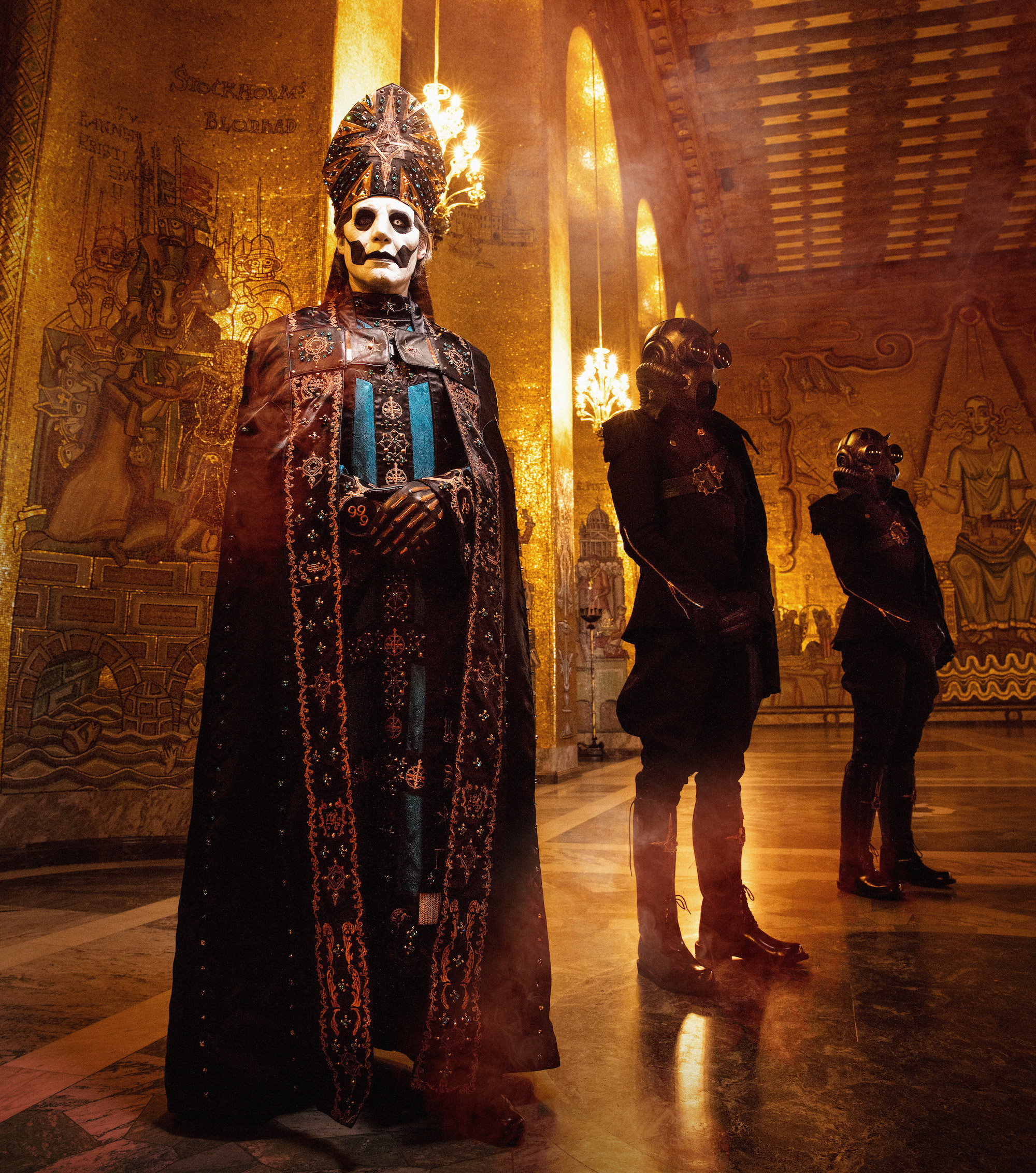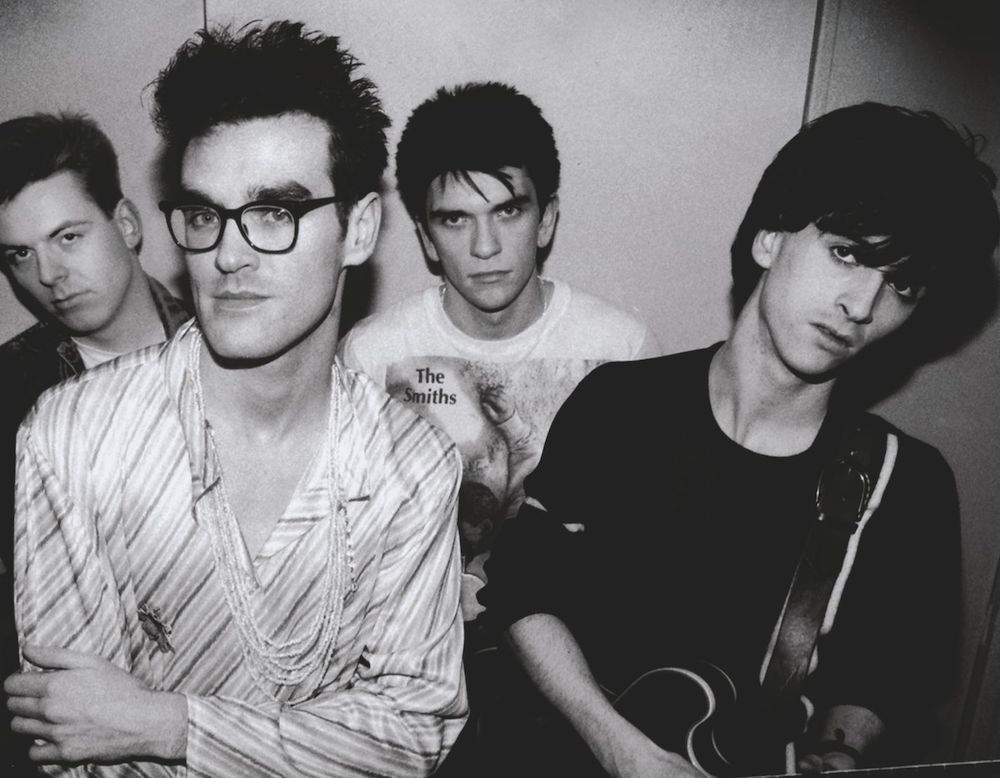Last month, the Swedish pop-metal outfit Ghost had their first-ever Billboard Hot 100 hit with "Mary On A Cross," a previously obscure B-side from a 2019 7-inch. As you might have guessed, both TikTok and Stranger Things were involved. Unlike Kate Bush and Metallica, whose respective chart ascents this year were powered by needle drops, Ghost rose on the back of a fan-made clip featuring scenes from the Netflix series. Virality did its thing, and soon "Mary On A Cross" was all over TikTok, soundtracking videos that had nothing to do with either Stranger Things or Ghost. ("Mary On A Cross" isn't on the list below; it isn't very good.)
A few days after Ghost landed on the Hot 100, their corpse-painted frontman Papa Emeritus IV (born Tobias Forge) threw out the opening pitch at a White Sox game for some reason. This level of ubiquity wasn't totally sudden – "Call Me Little Sunshine" had also just become their fifth US Mainstream Rock chart-topper – but for fans of the band's earliest work, their rise has felt profoundly strange.
Ghost's emergence at the beginning of the 2010s was fun and mysterious in a way it probably couldn't have been had the social media landscape been what it is today. Most early fans found their music through the Band Of The Week blog (R.I.P.) run by Fenriz from Darkthrone, an unlikely but revered tastemaker on the Blogspot-era metal internet. Nobody knew who Papa Emeritus was, nor any of the Nameless Ghouls who would eventually join him on guitar, bass, drums, and keys — and, at least at first, nobody seemed to be trying all that hard to figure it out. That sense of mystery carried into the music, which was stridently Satanic in content but infectiously earwormy in sound. We'd all heard paeans to the devil sung in a shrieking howl by his blood-soaked emissaries, but what was the deal with these guys who sounded like they were raised on ABBA? Ghost's stellar debut album, the cleverly titled Opus Eponymous, was widely likened to Mercyful Fate and Blue Öyster Cult, but it was even more generous with its saccharine hooks than those bands were.
After Opus Eponymous, Ghost quickly went from underground oddity to rising mainstream force. They signed to a major label subsidiary for their sophomore album, Infestissumam, and the once-laconic Forge started doing interviews and stage banter that leaned into his vaudevillian shtick. (There's now a rich Ghost lore involving the death and subsequent replacement of each of the band's frontmen, all of which are played by Forge.) Their sound changed, too, into something simultaneously poppier and more theatrical. If the first album sounded a little like Mercyful Fate, Ghost would eventually come to sound more like a Broadway musical loosely based on Mercyful Fate's career.
Some of the earliest Ghost fans – the ones who found them via Fenriz – have fallen away, only to be replaced by waves and waves of newcomers who have latched onto their bigger-than-life image and unapologetic craving for heavy metal stardom. Full disclosure: I'm one of those early fans, though I have found something to love about almost every album the band has done since Opus. (This list could easily include every song on Opus. It doesn't quite.) Their work doesn't always connect with me, but I'm deeply grateful to have them around. They're a metal band with a ruthless pop sensibility and a twisted take on the genre's iconography, and the way they force those two things to collide is almost always compelling.
"Jigolo Har Megiddo" (from Infestissumam, 2013)
Satan is often depicted as a figure of seduction. Accordingly, an undercurrent of lustful prurience roils beneath almost everything Ghost does. Forge's onstage persona leans into that lasciviousness with winking delight, but the songs themselves rarely come right out and say it. That makes "Jigolo Har Megiddo," a deep cut from Infestissumam, a precious gift. It's horny as hell, and it rides the sweatiest, sexiest groove in Ghost's catalog. The lyrics drip with faux-Biblical come-ons and dick jokes, and despite the goofiness inherent in the song's premise, it manages to sell Forge's apparently overwhelming sexual prowess. ("You crave the wand" isn't a line I'll be trying anytime soon, but more power to him.) In today's parlance: "Jigolo Har Megiddo" fucks.
"He Is" (from Meliora, 2015)
Every arena metal band needs a lighters-aloft power ballad in their setlist. Ghost found theirs with "He Is," a love song whose object, of course, is Lucifer. With its sculpted classicism and symmetrical structure, "He Is" resembles a devotional hymn as much as it does a rock song. Henrik Palm and Simon Söderberg, the Nameless Ghouls responsible for the guitars on Meliora, find an epiphanic depth of feeling in their deft acoustic-electric interplay. Forge, typically the embodiment of arrogant pride, delivers the chorus with something approaching reverent awe, as though the immensity of Satan's evil has stunned him into humility. Ghost have written other ballads since, but "He Is" remains their gold standard.
"Call Me Little Sunshine" (from Impera, 2022)
2018's lethargic Prequelle was a disastrous misstep, but Ghost have begun to right the ship with the Aleister Crowley-inspired Impera. (Opeth's Fredrik Åkesson plays all the guitar parts on the record, which certainly helps.) The album's lead single, "Call Me Little Sunshine," plays like a Satanic inversion of Depeche Mode's "Personal Jesus." Forge plays the part of Mephistopheles, offering succor through the computer screen: "You will never walk alone/ You can always reach me." "Little Sunshine" moves at an insistent midtempo stomp, its unhurried gait echoing the calm relentlessness of Forge's repeated entreaties to "call me." By song's end, you'll want to.
"Satan Prayer" (from Opus Eponymous, 2010)
A lot of the Mercyful Fate comparisons bestowed upon Ghost in the early days were thanks to "Satan Prayer." The Opus Eponymous highlight almost feels like a sequel to Fate's 1984 classic "The Oath." Both songs pervert familiar Christian rites, rendering them Satanic. While "The Oath" aped Coven's 1969 "Satanic Mass," the eerie "Satan Prayer" is very nearly a line-for-line rewrite of the Nicene Creed. Ghost's identities were still unknown when "Satan Prayer" dropped, and in that context, the song felt even more sinister — the work of some especially musically gifted Satanic cultists, rather than one of the first great tunes by a highly professional band. Even today, it's lost little of its power to unnerve.
"Cirice" (from Meliora, 2015)
One thing Ghost typically is not is "epic," that squiggly, hard-to-define quality that nevertheless comes to define a great many metal bands. "Cirice" is a towering exception. The Meliora centerpiece sees the band gliding gracefully from movement to movement, running a gripping melodic thread that connects delicate acoustic guitar, plaintive piano, thunderous drums, and haunting organ to one of the band's fattest, most memorable riffs. Forge is at his expressionist best, belting his lungs out in one moment and weaving a gossamer falsetto the next. The song feels truly enormous. It's enough to make you wish Ghost went epic more often.
"Stand By Him" (from Opus Eponymous, 2010)
The protagonist of "Stand By Him" is burned alive, executed for witchcraft after allegedly tempting a vicar into intercourse. A '70s exploitation-flick strain of feminism comes out in Ghost's decision to resurrect her through an occult ritual, unleashing her to run roughshod over her accusers. "It's the night of the witch tonight," Forge sings. "And the vengeance is hers for as long as she stands by him." The "him" in question is Satan, of course, and by the bouncing bass lines and power chord riffage of the song, it sounds like His Infernal Majesty throws a hell of a party. Our nameless heroine gets her revenge, and – to quote Mortuary Drape, another formative Ghost influence – all the witches dance.
"Ghuleh / Zombie Queen" (from Infestissumam, 2013)
"Ghuleh / Zombie Queen" is, like its title implies, really two songs. The first part of the diptych is both a smoldering ballad and an incantation, a piano-driven appeal for the undead object of Forge's affection to rise from her grave. It's perhaps the most starkly beautiful passage in the Ghost oeuvre. (Forge would deliberately undercut that beauty in live performances by playing the main melody on a kazoo.) The lightning bolt that splits the song in half is a chugging, repeated power chord. Out of that simple riff, the song transforms into a funhouse. I've seen "Zombie Queen" called surf-rock, rockabilly, psychedelia, and haunted house music, but none of those fully capture what feels more like Forge and his Ghouls doing whatever the hell they want. The song isn't merely academic in its experimentation with new sounds and textures; everything the band is doing serves its huge-as-hell chorus hook: "Black light guides you/ Ghuleh!/ Ghuleh!" It's Ghost's longest song, probably their weirdest, and easily one of their best.
"Elizabeth" (from Opus Eponymous, 2010)
Metalheads love Elizabeth Bathory. The Hungarian noblewoman and serial killer, who allegedly bathed in the blood of her young victims, has been the subject of countless musical tributes, none better than Ghost's "Elizabeth." Powered by some of the band's heaviest riffing and dense clouds of pipe organ, the song takes the expected metal-band route of siding with one of history's greatest monsters. Yet Forge's pleading, ever-ascending vocal somehow sells its sentiment as sensible — even sweet. Like so many gruesome Ghost tunes, "Elizabeth" is a stealth love song. "You're still alive, Elizabeth," Forge sings, calling out to her in the night, reassuring himself that his long-lost flame hasn't burned out.
"Square Hammer" (from Popestar, 2016)
Generally, I find Ghost more effective when they have one foot planted firmly in metal. That's not a hard and fast rule, though, because it doesn't account for "Square Hammer." The presence of distorted guitars is the only thing that anchors "Square Hammer" to metal. The song is a Swiss watch of a pop tune, an expertly devised hook delivery mechanism that doles out its dopamine hits on a satellite-synchronized timer. Forge sings the chorus (which itself is built out of a twice-repeated refrain) three times during the four minutes of "Square Hammer," and each time it feels like he's scratching an unreachable itch. Like most of the best pop songs, its apparent simplicity belies the dozens of tiny details that make it work — the tinkling glockenspiel melody that follows the "as bells begin to chime" lyric; the snare hits that shadow the same two syllables in each verse; the churning guitar line that underpins and counterbalances Forge's chorus vocal. These and countless other decisions make "Square Hammer" what it is. It's not a metal song. It doesn't matter.
"Ritual" (from Opus Eponymous, 2010)
Everything you could ever want from a Ghost song lurks somewhere in the stinking chapel that is "Ritual." It's the ur-text for the band's entire existence. Listening to it now, 12 years after it first trickled its way onto Fenriz's blog, it's still easy still hear the world-conquering potential that so many heard back then. The main riff is heavy but not too heavy, leaving plenty of space for the swirling guitar and organ melodies that Forge layers atop it. He tackles the grim lyrics about human sacrifice with a sweetly naïve lilt to his voice, only dropping into a more traditionally metal register for a recitation of the Lord's Prayer, rewritten to praise Satan. More important than any of its individual elements, though, is the way that "Ritual" moves. It feels like driving around on a cool summer night with the windows rolled down, something threatening lurking just beyond your field of vision. Just as "Satan Prayer" invited those Mercyful Fate comparisons, it's "Ritual" that made people think of Blue Öyster Cult. There's more than a little of "(Don't Fear) The Reaper" in the song, in the way it hides a razorblade of mortality in a candy apple of carefree youth. Ghost would build a career on making evil feel breezy. They never did that better than they did on "Ritual."
Stream our picks as a playlist on Spotify:






